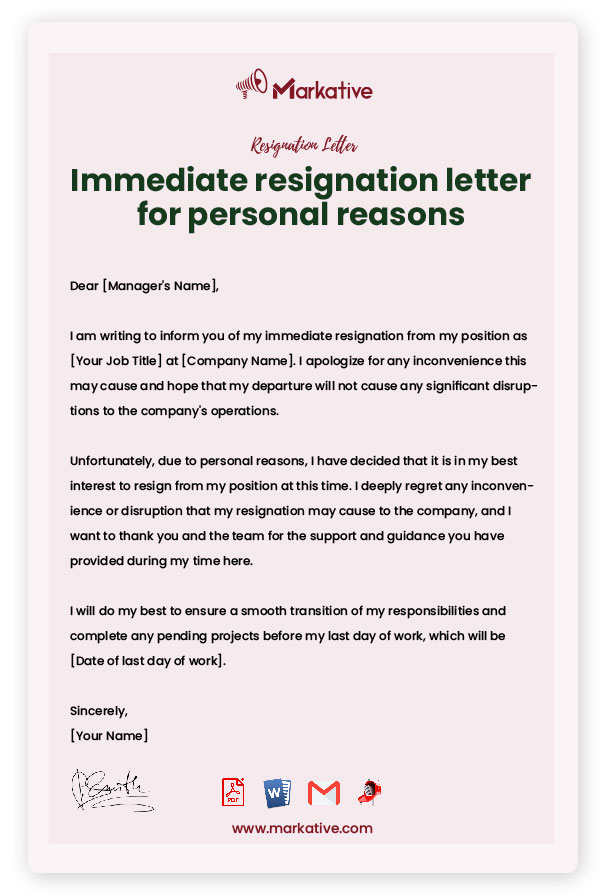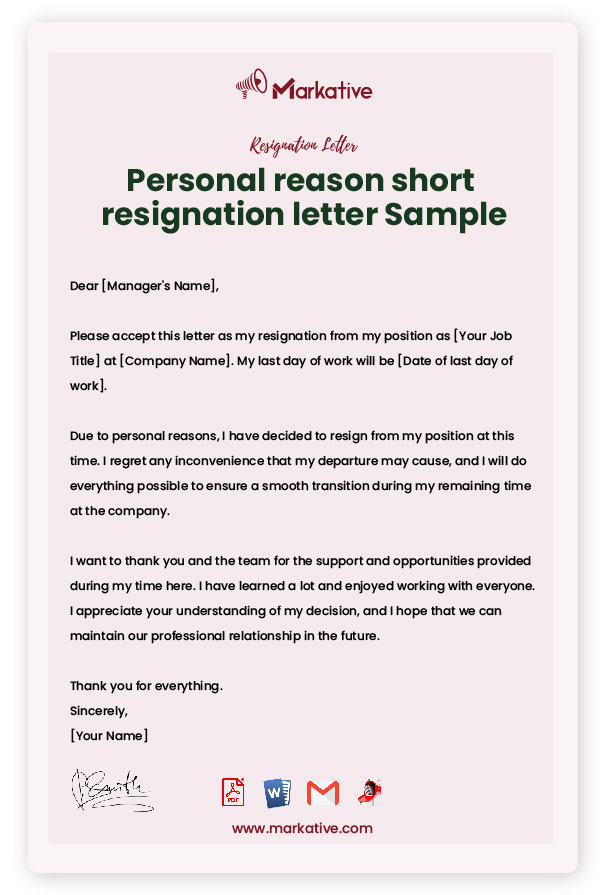Resigning from a job can be a challenging decision to make, especially when it’s for personal reasons. Whether you have a health issue, have family responsibilities, or simply want to pursue a new career path, writing a resignation letter for personal reasons is an essential step in the process. It’s not just a formality; it’s an opportunity to leave a positive impression on your employer and colleagues and ensure a smooth transition for all parties involved.
A well-crafted resignation letter can make a significant impact on your professional reputation and future job prospects. It shows that you are a responsible and courteous employee who values your employer and coworkers’ time and effort. A good resignation letter also helps you maintain your relationship with your employer and keeps the door open for potential opportunities in the future. Additionally, it sets a positive tone and creates a sense of closure, allowing you to move forward with confidence and without burning any bridges.
In this article, we will discuss the importance of writing a Resignation letter for personal reasons, how to write a good resignation letter, and some tips to make the process less stressful. Whether you’re resigning because of health issues, family responsibilities, or other personal reasons, this article will guide you through the process and help you make a smooth transition. By the end of this article, you’ll have a better understanding of why a good resignation letter matters and how it can impact your professional reputation.
How To Write a Resignation letter for personal reasons?
Resigning from a job can be a tough decision, especially when it’s for personal reasons. However, writing an appealing resignation letter can help you leave on good terms and maintain your professional reputation. Here are five steps on how to write an appealing resignation letter for personal reasons, with examples.
- Start with a positive tone and express gratitude for the opportunity to work with the company. Example: “I want to start by expressing my sincere gratitude for the opportunities and experiences I have gained during my time at XYZ Company.”
- State the reason for your resignation briefly and objectively. Example: “Due to personal reasons, I have decided to resign from my position at XYZ Company.”
- Offer to help with the transition and ensure a smooth handover of your duties. Example: “I am willing to help in any way possible to ensure a smooth transition and handover of my responsibilities.”
- Express your willingness to provide assistance during the notice period and offer to maintain contact after you leave. Example: “I am available during my notice period to assist in any way possible, and I would love to maintain contact after my departure.”
- End with a positive tone, reiterate your appreciation for the opportunity and wish the company success. Example: “I want to thank you again for the opportunity to work with such an amazing company. I wish the company continued success and growth in the future.”
In conclusion, writing an appealing resignation letter is essential to leave on good terms with your employer and colleagues. By following these five steps and using the examples provided, you can craft a well-written and professional resignation letter that reflects positively on your professional reputation.
Resignation letter due to personal reasons Sample
Dear [Manager's Name], I am writing to inform you that I am resigning from my position as [Job Title] at [Company Name], effective [Date of Resignation]. The reason for my resignation is due to personal reasons that require my immediate attention. I want to express my gratitude for the opportunity to work with such a great company and to have been part of an amazing team. During my time at the company, I have gained valuable experience and developed meaningful relationships that I will always cherish. I will ensure a smooth transition by completing all of my current tasks and providing support to my colleagues. Please let me know how I can assist in finding a suitable replacement. Thank you again for your understanding and support during this difficult time. Sincerely, [Your Name]

Immediate resignation letter for personal reasons Sample
Dear [Manager's Name], I regret to inform you that I am resigning from my position as [Job Title] at [Company Name], effective immediately. I understand that this sudden departure may cause inconvenience and disruption to the company, and I apologize for any inconvenience caused. The decision to resign was a difficult one for me to make, but due to personal reasons that require my immediate attention, I have no other choice but to step down. I appreciate the opportunity to have been part of such a great company and I will always be grateful for the experience and knowledge gained during my time here. I will ensure a smooth transition by completing all of my current tasks and making sure that my colleagues have access to any necessary information. Please let me know how I can assist in finding a suitable replacement. Thank you for your understanding and support during this difficult time. Sincerely, [Your Name]
For More: How To Write Best Immediate Resignation Letter [5+ Templates]
Simple resignation letter sample for personal reasons
Dear [Manager's Name], I am writing to inform you of my resignation from my position as [Job Title] at [Company Name]. My last day of work will be on [Date of Resignation]. This was a difficult decision for me to make, but I have decided to step down due to personal reasons that require my immediate attention. I want to take this opportunity to thank you and the entire team for the opportunity to work with such a fantastic company. I have learned a lot from everyone and appreciate the support and guidance provided during my time here. I will ensure a smooth transition during my remaining time at the company and will complete all of my current projects. I am available to help with the transition process in any way possible. Thank you again for everything. Sincerely, [Your Name]
Sample Resignation letter due to personal reasons
Dear [Manager's Name], I am writing to inform you that I am resigning from my position as [Job Title] at [Company Name], effective [Date of Resignation]. This was a difficult decision for me to make, but I have decided to step down due to personal reasons that require my immediate attention. I want to take this opportunity to express my gratitude for the opportunity to work with such a fantastic team. During my time at the company, I have gained valuable experience and developed meaningful relationships that I will always cherish. I will ensure a smooth transition during my remaining time at the company, completing all of my current projects and providing support to my colleagues. Please let me know how I can assist in finding a suitable replacement. Thank you again for your support during my time at the company. Sincerely, [Your Name]

Personal reason short resignation letter Sample
Dear [Manager's Name], I am writing to inform you of my resignation from my position as [Job Title] at [Company Name]. My last day of work will be on [Date of Resignation]. I have decided to resign due to personal reasons that require my immediate attention. I want to thank you and the entire team for the opportunity to work with such a fantastic company. I have learned a lot from everyone and appreciate the support and guidance provided during my time here. I will ensure that all of my current projects are completed before my departure, and I am available to help with the transition process in any way possible. I would also like to extend my offer to train my replacement during my remaining time at the company. Thank you again for everything. Sincerely, [Your Name]
How Much Notice Should You Give for a Resignation letter for personal reasons?
According to a survey conducted by Glassdoor, 68% of employees stated that their company’s response to their resignation affected their decision to stay or leave. This statistic highlights the importance of writing a professional and respectful resignation letter when leaving a job, especially when it’s for personal reasons. However, one of the most common questions employees face when resigning is how much notice they should give.
In general, it’s recommended to give at least two weeks’ notice when resigning from a job, regardless of the reason. This gives your employer enough time to find a replacement or make arrangements for the transition of your responsibilities. However, the specific notice period may vary depending on your employment contract, company policies, and the nature of your job.
Some companies may require a longer notice period, especially for senior positions, while others may accept a shorter notice period. It’s essential to review your contract and company policies and consult with your HR department to determine the appropriate notice period.
Is it Ok To Email a Resignation letter for personal reasons?
In today’s digital age, email has become a common form of communication in the workplace, including when it comes to resignations. While some people may prefer to deliver a resignation letter in person or by mail, it’s generally acceptable to email a resignation letter for personal reasons. However, it’s essential to ensure that the email is professional, and respectful, and addresses all the necessary information, including your reason for leaving, your last day of work, and your contact information.
For example, your resignation email might look something like this:
Dear [Manager's Name], I am writing to inform you that I have decided to resign from my position as [Job Title] at [Company Name], effective [Date of Resignation]. This was a difficult decision to make, but due to personal reasons, I feel that it's the best choice for me at this time. I want to thank you and the entire team for the opportunity to work with such a fantastic company. I have enjoyed my time here and learned a lot from everyone. Please let me know if there's anything I can do to ensure a smooth transition during my notice period. Thank you again for everything. Best regards, [Your Name]
Common Mistakes When Writing a Resignation letter for personal reasons?
Resigning from a job can be an emotional and challenging experience, especially when it’s for personal reasons. Writing a resignation letter may seem like a simple task, but there are common mistakes that employees make that can affect their professional reputation. Here are three common mistakes to avoid when writing a resignation letter for personal reasons:
- Being too emotional or negative: While it’s essential to express your reasons for leaving, it’s important to avoid being too emotional or negative in your resignation letter. Focus on the positive experiences you had in the job and the skills you gained rather than airing any grievances or complaints.
- Not giving enough notice: Giving sufficient notice is important to ensure a smooth transition and maintain a good relationship with your employer. Make sure to check your employment contract or company policies to determine the appropriate notice period and adhere to it.
- Forgetting to thank your employer and colleagues: Regardless of your reasons for leaving, it’s important to express gratitude to your employer and colleagues for the opportunity to work with them. This shows that you appreciate the experiences and skills you gained during your time at the company and leaves a positive impression.
By avoiding these common mistakes and crafting a well-written, professional resignation letter, you can leave your job on good terms and maintain your professional reputation.
Conclusion:
Resigning from a job for personal reasons can be a challenging decision, but writing a resignation letter can help make the process smoother and maintain a positive professional relationship. When writing a resignation letter, it’s important to avoid common mistakes such as being too emotional, not giving enough notice, and forgetting to express gratitude. Additionally, it’s crucial to determine the appropriate notice period and follow the company policies and employment contract.
Sending the resignation letter via email is generally acceptable, but it’s important to ensure that the email is professional and includes all necessary information. In this article, we have provided multiple free and ready-to-use templates, samples, and examples to help employees write a professional resignation letter for personal reasons.
By following these guidelines and using the templates provided, employees can write a resignation letter that leaves a positive impression and maintains a professional relationship with their employer and colleagues.

![How To Write Resignation letter for personal reasons [5 Free Samples]](https://markative.com/wp-content/uploads/2023/04/How-To-Write-Resignation-letter-for-personal-reasons-5-Free-Samples-810x476.jpg)





